- Home
- Robert B. Parker
School Days s-33 Page 4
School Days s-33 Read online
Page 4
The excitement of the woman with the good-looking butt had passed. Marlboro Street was peaceful again. I thought about calling Susan. It was early. Eleven o'clock was the more-or-less scheduled time. She probably wouldn't be there. Probably out to dinner with someone other than me. If I called and she wasn't there, it would make me feel a little unhappy twinge in the pit of my stomach. Better to wait.
I drank some scotch.
I couldn't think of any way I could possibly keep them from sending Jared Clark away for the rest of his life. He said he did it. He showed no remorse. And it was certainly hard to Iike him. Besides, he deserved to do some time for aggravated smirking. I had deposited the retainer, but I hadn't spent it. I could give it back to Mrs. Ellsworth and tell her the kid was guilty as charged.
My glass was empty. I went to my kitchen and added fresh ice and Dewar's and a lot of soda.
"Kid's a creep," I said to Pearl.
She opened her eyes on the couch and looked at me without raising her head. I sat on the livingroom side of my kitchen counter.
"I wonder if Mrs. Ellsworth knows that?"
Pearl seemed disinterested.
"She must have some idea," I said.
I drank some scotch.
"There's no one in there," I said to Pearl. "Unless it's all denial and bravado, and there's a scared little kid in there."
Pearl had no reaction.
"It doesn't feel like denial," I said. "It feels like empty."
I liked the way the tall glass looked with the pale scotch and soda over the slick ice, and the hint of moisture glossing the outside of the glass. I liked the way the ice felt against my upper lip when I drank.
"Malt does more than Milton can......" I said.
Pearl had heard me say it before.
"Always thought Auden said that until some guy corrected me at one of Susan's parties. He said it was Housman. I was scornful of the poor, dumb, pretentious bastard, but I felt in fairness I should look it up."
Pearl's breathing was steady on the couch. I wasn't sure she was listening.
"It was Housman," I said.
I drank some scotch. My apartment was thick with silence. The scotch made it seem full of portent.
"I hate when I'm wrong," I said.
Pearl took no notice.
"I can't tell her," I said.
Pearl shifted and stuck her feet in the air and leaned them against the back of the couch and looked at me upside down for a moment before she closed her eyes again.
"I don't actually know he's not innocent," I said.
"Why would he lie?"
"Maybe he's crazy."
"Maybe he's simply bad."
"Bad?"
"You don't believe in bad, how you going to believe in good?"
"You metaphysical devil."
Pearl's position as she slept had caused her mouth to fall open and her tongue to loll out the left side of it. I looked at her.
"Yeah," I said. "That's about where I am.
Chapter 12
IN THE MORNING it was still not raining, and still on the verge of it, when Pearl and I drove out to Dowling to visit Jared Clark's parents. They lived on some rolling green acreage, in a large, white house with a three-car garage.
It was cool with the foreboding rain. I left Pearl in the car with the windows partly open and walked to the front door and rang the bell. The woman who answered was only a few soft pounds short of heavy, with a kind of blank, blond prettiness that had probably gotten her cheerleading work in high school.
"Mrs. Clark?" I said.
"Yes."
"I'm Spenser."
"Oh, yes. Thank you. Please come in."
She was wearing a bright orange top and white pants and on her feet an attractive pair of flip-flops with orange straps to match her top, and in the center of each strap an ornamental plastic flower. I followed her into the enormous living room. It had the spontaneity of a furniture showroom, and gleamed with the spotless silence of for-company-only. Her husband was standing by the fireplace at the far end. He went perfectly with the room. He had on a pink polo shirt with a discreet alligator on the chest, pleated olive Dockers, and dark leather sandals. He was a nice-looking guy with sandy hair. His face had the same softness his wife's did. He walked to me and put out his hand.
"Ron Clark," he said.
We sat. I had the sense that my butt may have been the first one ever to press against the barrel-backed red armchair I was on.
I declined coffee, fearing I might spill some. Ron and his wife'sat together across from me on a couch. They decided against coffee, too.
"How can we help," Ron said.
Here it was. I didn't like it, but at least it was quick. We didn't have to waste time talking about how rainy the summer had been.
"Do you believe he's guilty?" I said.
Mrs. Clark began to cry. Her husband put his hand on her thigh and patted it.
"He's our only child," Ron said.
I waited. Mrs. Clark continued to cry quietly, her head down, staring at her husband's hand on her thigh.
"Since he was born," she said quietly, "he had this distance about him."
The crying seemed to be tears only. Her voice was clear. Her husband nodded.
"It was like he was always thinking about something else," she said.
"Maybe if we'd had other children," her husband said. "Maybe if he'd had a brother. . ."
"He was never really a bad boy," his mother said. "His grades were good. He was never in trouble. He was just never with us, exactly."
We sat silently in the lifeless, perfect room.
After a while I said, "Do you believe that he's guilty?"
Still crying, without looking up, Mrs. Clark nodded yes. I looked at Ron Clark.
"My God," Clark said, "he confessed."
"Why do you suppose he did it?" I said.
Mrs. Clark's head was still down. She continued to cry quietly.
"We've asked each other a thousand times," she said.
"Sometimes," Clark said, "sometimes I think that maybe he did it for no reason. He did it because he wanted to."
"What does he say?" I asked.
"He doesn't," Clark said. "He won't talk about it."
"Is he mad at you?" I said.
"He doesn't seem to be," Clark said. "You think, Dot?"
"He doesn't seem to feel very much of anything," she said softly.
"His grandmother thinks he's innocent," I said.
"My mother-in-law," Clark said, "has a lot of money. It makes her think anything she wants to believe is right."
"Mrs. Clark?" I said.
"Often wrong but never uncertain, my father used to say."
"Was she close to Jared?"
"She thought so," Ron said.
"Did Jared like her?" I said.
"Hard to tell with Jared," Dot said.
"She wouldn't even know," Ron said. "She's so damned self-absorbed. She thinks he's innocent because he's her grandchild, and her grandchild can't be guilty of anything."
Dot Clark looked up at me. Crying had not helped her makeup any.
"Ron is quite hard on my mother," she said. "I know she cares for Jared."
"Were he and Wendell Grant close?" I said.
"I guess so," she said. "I didn't really know a lot about Jared's friends."
I looked at Ron. He shrugged.
"If he did do the shooting," I said, "do you know where he might have gotten the guns?"
They both shook their heads. It was a question every cop they'd talked to had asked.
"Do you wish me to prove him innocent?" I said.
They stared at me. Then at each other.
"We do not wish to have our hopes raised," Ron said carefully. "We are struggling to accept what is."
"Do you have any idea?" Dot said. "How could you possibly? We've lived here in this town for almost twenty years. We moved here to be part of this. To be part of a small town, and have friends, and know everybody an
d have everybody know us and . . ." She was looking straight at me and rolling her hands as she spoke, as if she were mixing bread dough.
"They all know us now," Ron said.
Dot finished her sentence as if he hadn't spoken.
". . . feel, like, the rhythm of community life. To belong to something."
"And now?" I said.
Ron shook his head slowly.
"How could you possibly prove him innocent?" Dot said.
"I don't know," I said. "May I look at his room?"
Chapter 13
"MAY WE LEAVE YOU," Dot Said. "We don't really like to come in here."
"Sure," I said. "I'll just sort of look around and think a little."
"Ronny and I will be downstairs," she said, and went.
I sat on the edge of the kid's bed. The room was blue and as soulless as the living room. The walls were darker blue, the ceiling a lighter shade. The bed was perfectly made with a brand-new blue quilt, with matching designer pillows stacked against the headboard. There was a bureau against the far wall, and a closet. A television sat on top of the bureau. There were no pictures on the walls. I opened the drawer in the bedside table. It was empty and clean. The drapes on the big window beside the bed were a darker blue than the walls. I looked under the bed. Nothing. Not even dust. I felt around under the mattress. Nothing. I stood and went to the closet. It was empty. I opened the bureau drawers. They were empty and lined with clean white paper. I went back and sat down on the kid's bed again.
As soon as he was gone they had cleaned out his room. It was as if they had emptied the room of him. Tried to render it pre-Jared, as if they could return life to the time when they had moved here and it was mostly possibility. There was no vestige of him. There had been no pictures in the living room. None of the cheap garish cardboard-framed school photographs that every parent had of every kid. No team photographs. No musical instruments. No CDs. It was as if he'd never existed, as if he'd never lain on this bed in the darkness and thought about sex or eternity or the American League. As if there had been no imaginary passions, no fantasized moments of derring-do, no terrifying moments of imagination when life's limitations nearly overwhelmed him. No graphic sexual conquests of women older than himself.
The room was empty and neutral and impenetrable. The only story it told me was that it had no story to tell. I got up and very carefully smoothed out the quilt where I had sat. I looked out the window. From here, I could see my parked car. I couldn't see clearly from here, but Pearl might have been sitting in the driver's seat. It was darker now than it had been, and rain began to spat disinterestedly against the window. I wondered if Jared had had a dog. I looked at the neat, color-coordinated, blank room upstairs in the neat, color-coordinated, blank house.
No. He didn't have a dog.
Chapter 14
I was walking across the parking lot with Alex Taglio, toward the main entrance of the Bethel County jail.
"What good does it do my guy to talk with you?" Taglio said.
"What harm?" I said.
"Say somehow, crazy as it is, you convince people that Clark isn't guilty," Taglio said. "My guy already rolled on him. Where would that leave us?"
"Maybe if he's innocent, he shouldn't be rolled on," I said.
"He is not innocent," Taglio said. "I said what if you convince people."
"If he's guilty, I don't want to get him off," I said.
"Oh, fuck," Taglio said, "I don't know what I'm arguing about. Rita already talked me into it."
"Sexual favors?" I said.
"I wish," Taglio said. "You ever?"
I shook my head.
"Married?"
"Sort of," I said.
"Sort of?"
"You?" I said.
"Mary Lou Monaghan," he said. "Five kids. She caught me fooling around, she'd cut off my wanker."
We went into the jail.
They got us seated, as far as I could tell, in the same interview room where I'd talked with Jared. When the guards brought Wendell in, they put him in the same chair. Might have been the same guards.
"First of all, Wendell," Taglio said, "Mr. Spenser's got no legal authority here. You don't have to talk with him if you don't want to."
"Like I got something else to do?" Wendell said.
He was a big, robust kid with pink cheeks and thick lips and smallish eyes. He had a white-blond crew cut. And he seemed to swagger even sitting down.
"He asks you something you don't like, you don't have to answer," Taglio says. "He asks you something and I tell you not to answer, you don't answer. Unnerstand."
"Sure, you bet, Alex. I do just what you say and everything'Il be really fucking sweII," the kid said.
Taglio sat back and let his face go neutral.
"I want to talk with you about Jared Clark," I said.
"No shit," Wendell said.
"Which one of you got the guns?" I said.
"Man, I told everybody already. I don't know where the guns came from. They were just there, man, when we decided we needed them."
"Why'd you need them?"
"To shoot up the fucking school, man. Whaddya think?"
"Whose idea was that?" I said.
"I told everybody this shit before," Wendell said. "Ten times. The cops, the lawyers, the jerkoff fucking shrinks. My old lady. Ten times. We wanted to do it. We did it. Here we are. End of story."
I nodded. Fun.
"What do you think of Jared?" I said.
"Huh?"
"Jared," I said. "What do you think of him."
"He bailed on me, man. He put his little sissy tail between his legs and snuck out, left me to deal with the cops."
`And it wasn't supposed to be that way?"
"Hell, no."
"How was it supposed to be?" I said.
"Stand-up, man. Two stand-up guys in there giving the cops the finger when they finally came in."
"But Jared got scared?"
"Looks like it," Wendell said.
"That why you rolled on him?" I said.
"Rolled?"
"You ratted him out to the cops."
"The fuck wasn't going to leave me with the bag."
"Plus, you got a deal," I said.
"That is between us and the District Attorney," Taglio said. "There's no reason for you to discuss that, Wendell."
"Whatever," Wendell said.
"So how do we know you didn't just make it up that Jared was there?" I said.
" 'Cause the fucker confessed, man. Would that be some kind of fucking clue."
"Good point," I said. "Must be a drag after being close with a guy all this time, he bails on you the minute things get rough."
Wendell shrugged. "We wasn't so close."
"You enter into a plot to kill seven people with a guy you weren't close to."
"Sure, it was like, you know, business partners," Wendell said and laughed. "Wasn't like we was gonna get married or something."
"But you must have had reason to think you could trust him."
Wendell shrugged.
"But you couldn't," I said.
Wendell shrugged again.
"Make you mad?"
"Fuck him, man. I got it done without him."
"Got what done?" I said.
"I took care of business," he said.
"You shot those people without him?"
Taglio put a hand on Wendell's arm. Wendell looked at him. Taglio shook his head.
"I'm not talking about that," Wendell said.
"You know who shot whom?" I said.
Wendell shook his head.
"Did you shoot more or did Jared?"
Wendell shook his head.
"There were fifteen people shot," I said. "One of you must have shot more than the other unless both of you shot at least one of the same people."
Wendell shrugged.
"Maybe you both shot them all," I said.
"Fuck you," Wendell said. "I ain't talking to you no more."
; "Everybody says that to me," I said. "Sooner or later."
Chapter 15
WENDELL GRANT'S MOTHER's name was Wilma. She ran a little health-food store near the center of town, with four tables outside, where you could sit and consume sassafras tea and bean sprouts on whole-grain bread. She was a pale woman with big, dark eyes and dark, straight, shoulder-length hair, which was beginning to show some gray. The day I went to see her, she was wearing an ankle-length gray dress with blue flowers, and leather sandals. There was no sign of makeup.
It was three o'clock in the afternoon. The store was empty of customers, and Wilma Grunt sat with me at one of the small tables on the sidewalk outside the store. She drank some tea. I didn't.
"He just never . . ." she said.
I nodded.
"He never was what I wanted him to be," she said.
Her nails were square and clean, and devoid of polish. Her hands looked as if she washed them often.
"And Wendell's father?" I said.
She shook her head.
"No father?" I said.
"Except in a biological sense," she said. "I'm a single mother. His father is an anonymous sperm donor."
"And you've never been married?"
"No."
"Are you a lesbian?" I said.
"Not being married doesn't mean you are homosexual," she said.
"I know," I said.
"Are you married?"
"No."
She smiled slightly and nodded.

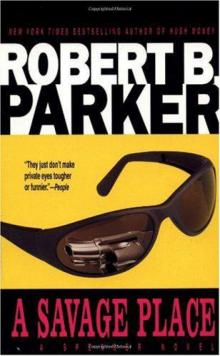 A Savage Place s-8
A Savage Place s-8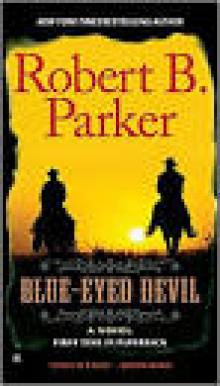 Appaloosa / Resolution / Brimstone / Blue-Eyed Devil
Appaloosa / Resolution / Brimstone / Blue-Eyed Devil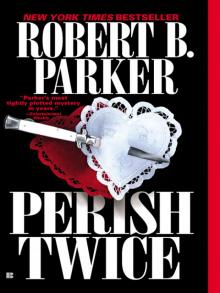 Perish Twice
Perish Twice Spare Change
Spare Change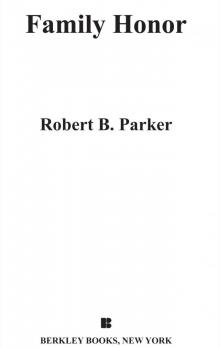 Family Honor
Family Honor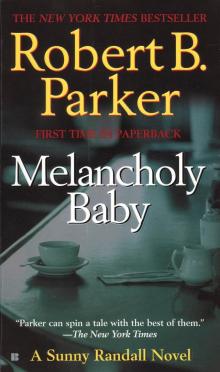 Melancholy Baby
Melancholy Baby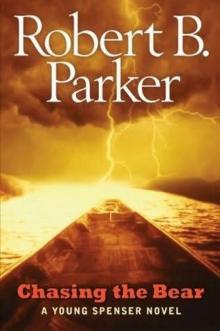 Chasing the Bear
Chasing the Bear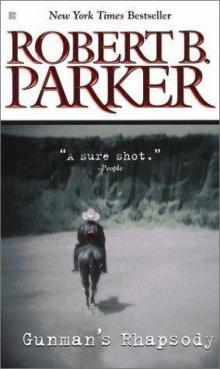 Gunman's Rhapsody
Gunman's Rhapsody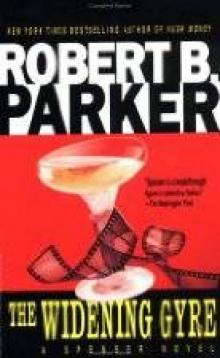 The Widening Gyre
The Widening Gyre Thin Air
Thin Air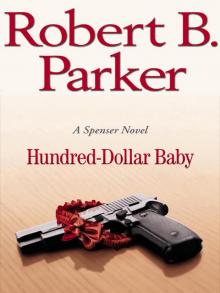 Hundred-Dollar Baby
Hundred-Dollar Baby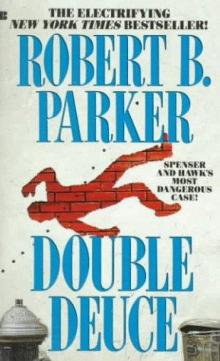 Double Deuce s-19
Double Deuce s-19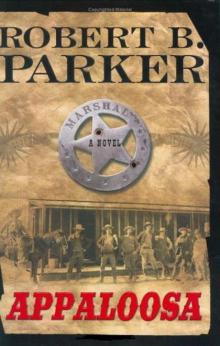 Appaloosa vcaeh-1
Appaloosa vcaeh-1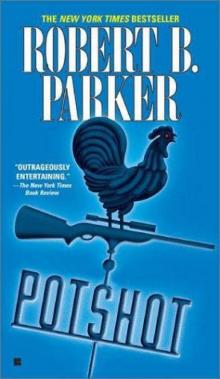 Potshot
Potshot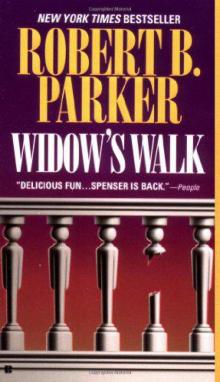 Widow’s Walk s-29
Widow’s Walk s-29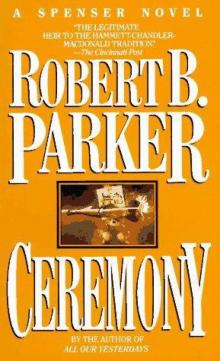 Ceremony s-9
Ceremony s-9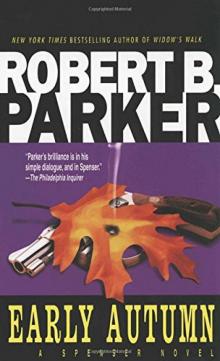 Early Autumn
Early Autumn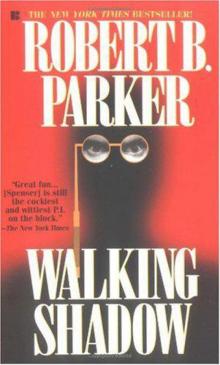 Walking Shadow s-21
Walking Shadow s-21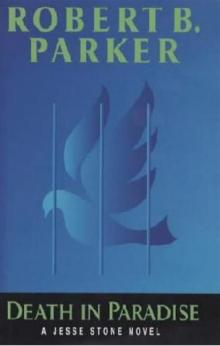 Death In Paradise js-3
Death In Paradise js-3 Shrink Rap
Shrink Rap Blue-Eyed Devil
Blue-Eyed Devil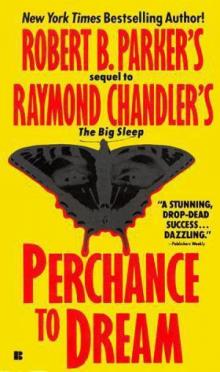 Perchance to Dream
Perchance to Dream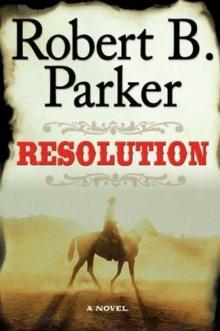 Resolution vcaeh-2
Resolution vcaeh-2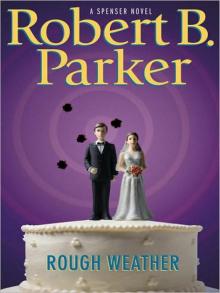 Rough Weather
Rough Weather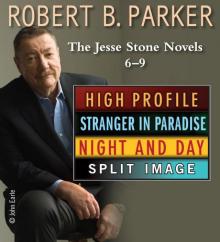 The Jesse Stone Novels 6-9
The Jesse Stone Novels 6-9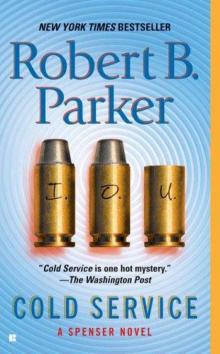 Cold Service s-32
Cold Service s-32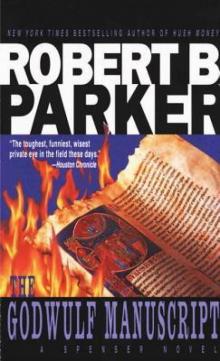 The Godwulf Manuscript
The Godwulf Manuscript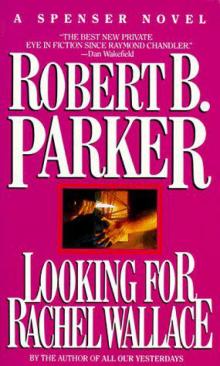 Looking for Rachel Wallace s-6
Looking for Rachel Wallace s-6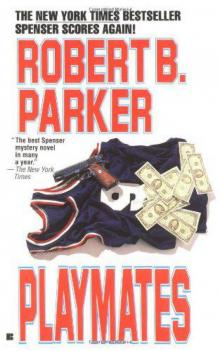 Playmates s-16
Playmates s-16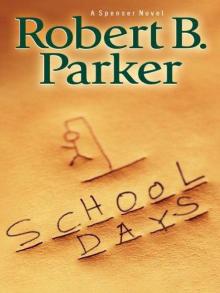 School Days s-33
School Days s-33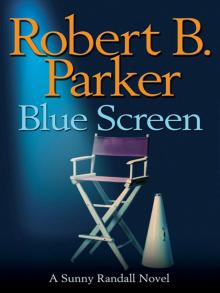 Blue Screen
Blue Screen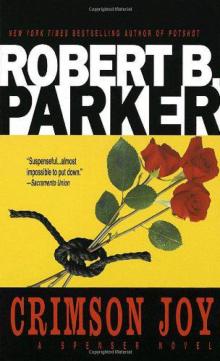 Crimson Joy
Crimson Joy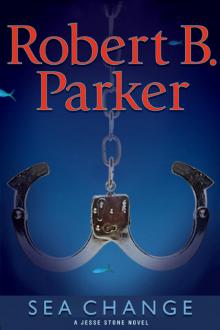 Sea Change js-5
Sea Change js-5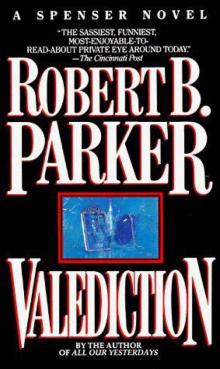 Valediction s-11
Valediction s-11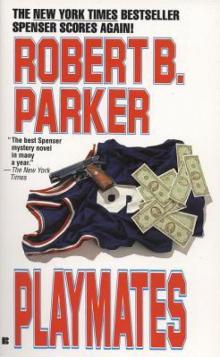 Playmates
Playmates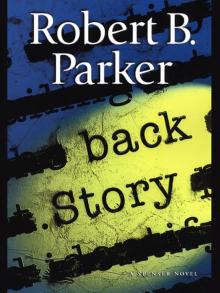 Back Story
Back Story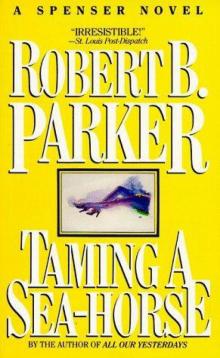 Taming a Sea Horse
Taming a Sea Horse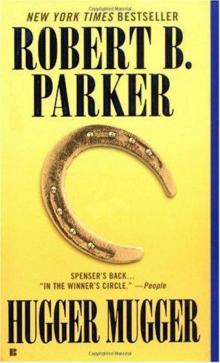 Hugger Mugger
Hugger Mugger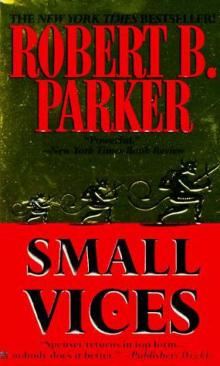 Small Vices s-24
Small Vices s-24 Silent Night: A Spenser Holiday Novel
Silent Night: A Spenser Holiday Novel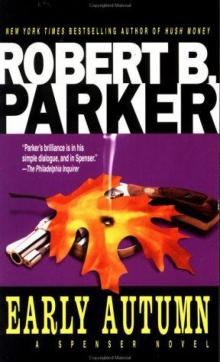 Early Autumn s-7
Early Autumn s-7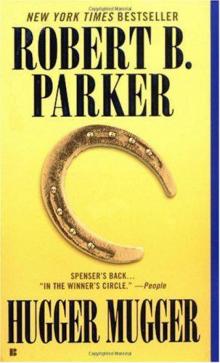 Hugger Mugger s-27
Hugger Mugger s-27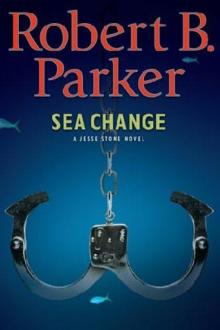 (5/10) Sea Change
(5/10) Sea Change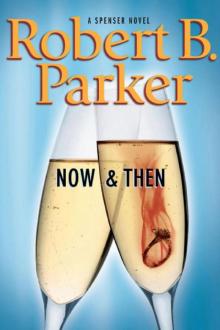 Now and Then
Now and Then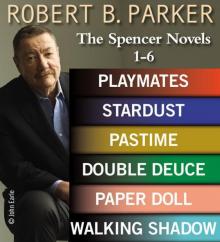 Robert B. Parker: The Spencer Novels 1?6
Robert B. Parker: The Spencer Novels 1?6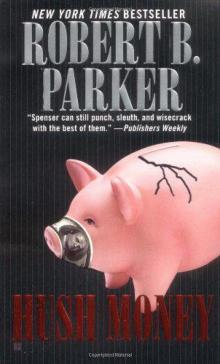 Hush Money s-26
Hush Money s-26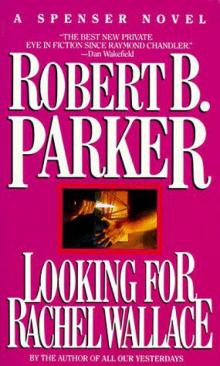 Looking for Rachel Wallace
Looking for Rachel Wallace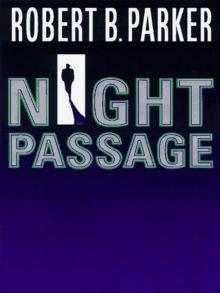 Night Passage
Night Passage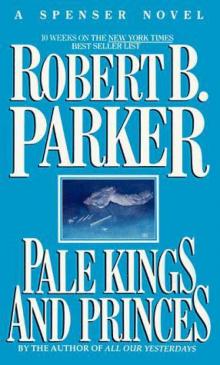 Pale Kings and Princes
Pale Kings and Princes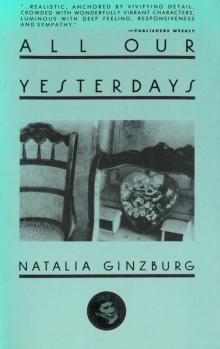 All Our Yesterdays
All Our Yesterdays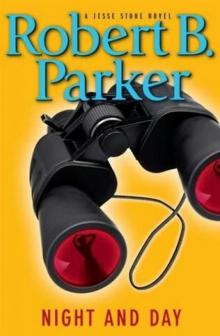 Night and Day js-8
Night and Day js-8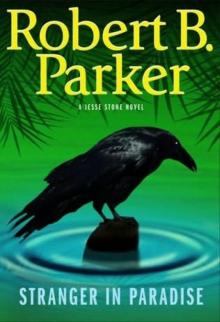 Stranger in Paradise js-7
Stranger in Paradise js-7 Double Play
Double Play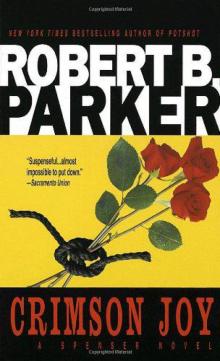 Crimson Joy s-15
Crimson Joy s-15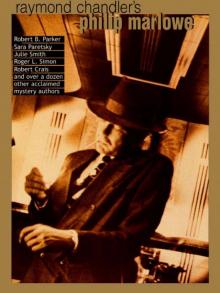 Raymond Chandler's Philip Marlowe
Raymond Chandler's Philip Marlowe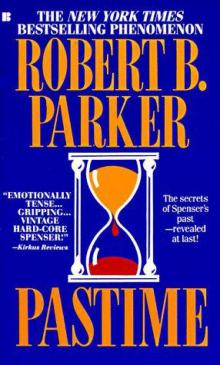 Pastime
Pastime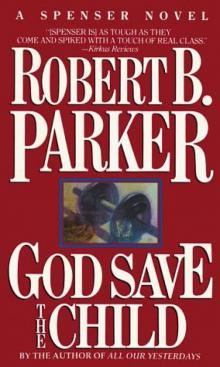 God Save the Child s-2
God Save the Child s-2 Bad Business
Bad Business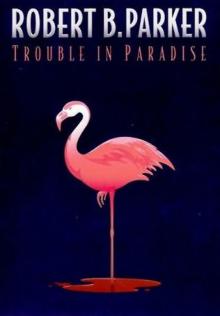 Trouble in Paradise js-2
Trouble in Paradise js-2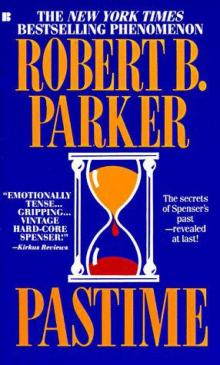 Pastime s-18
Pastime s-18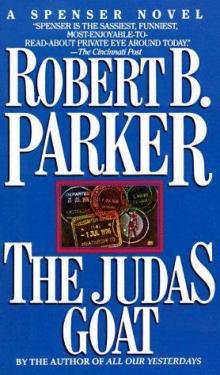 The Judas Goat s-5
The Judas Goat s-5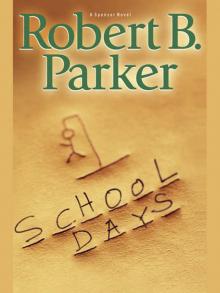 School Days
School Days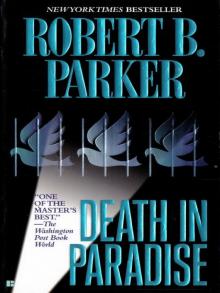 Death In Paradise
Death In Paradise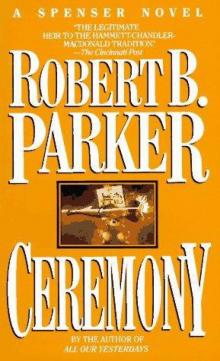 Ceremony
Ceremony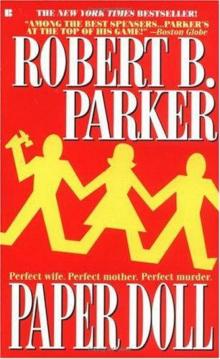 Paper Doll s-20
Paper Doll s-20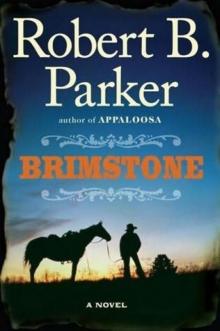 Brimstone vcaeh-3
Brimstone vcaeh-3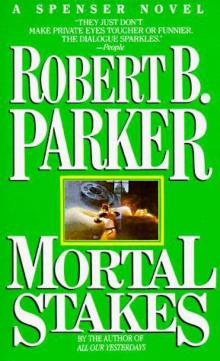 Mortal Stakes s-3
Mortal Stakes s-3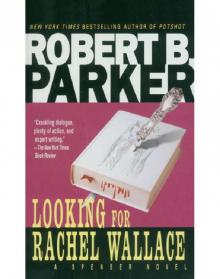 Spencer 06 - Looking for Rachel Wallace
Spencer 06 - Looking for Rachel Wallace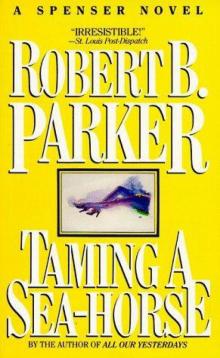 Taming a Sea Horse s-13
Taming a Sea Horse s-13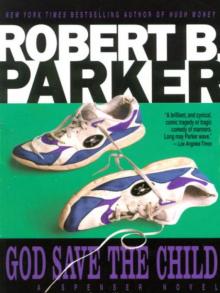 God Save the Child
God Save the Child Chance
Chance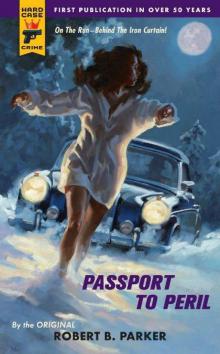 Passport To Peril hcc-57
Passport To Peril hcc-57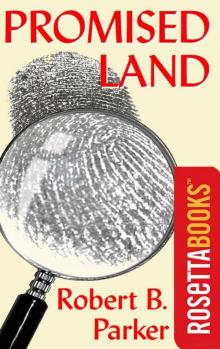 Promised Land
Promised Land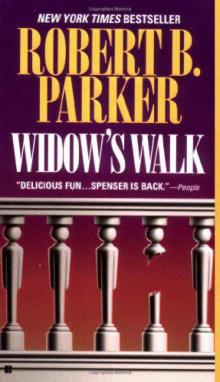 Widow’s Walk
Widow’s Walk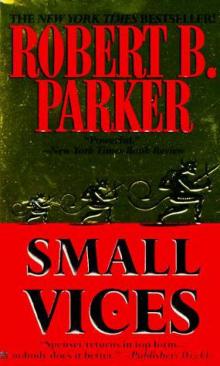 Small Vices
Small Vices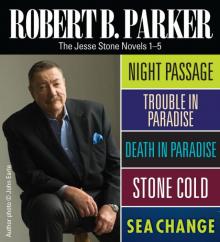 Robert B Parker: The Jesse Stone Novels 1-5
Robert B Parker: The Jesse Stone Novels 1-5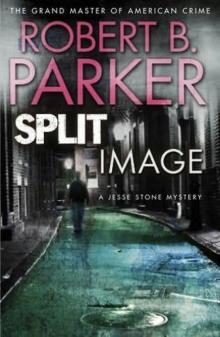 Split Image js-9
Split Image js-9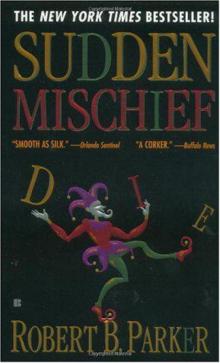 Sudden Mischief s-25
Sudden Mischief s-25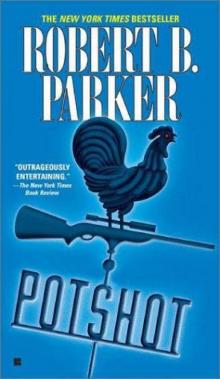 Potshot s-28
Potshot s-28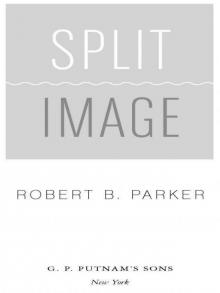 Split Image
Split Image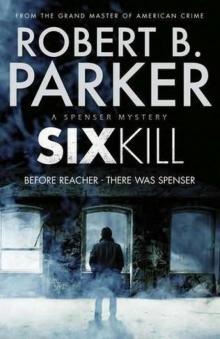 Sixkill s-40
Sixkill s-40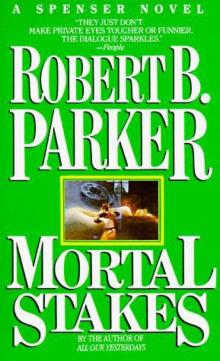 Mortal Stakes
Mortal Stakes Stardust
Stardust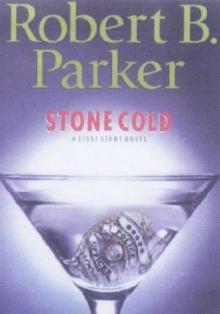 Stone Cold js-4
Stone Cold js-4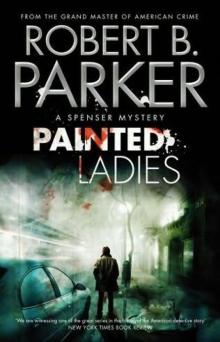 Painted Ladies s-39
Painted Ladies s-39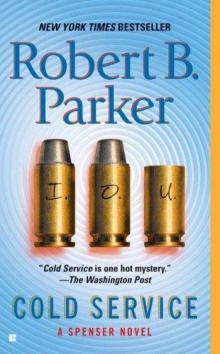 Cold Service
Cold Service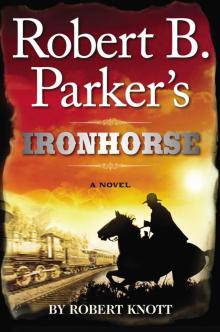 Ironhorse
Ironhorse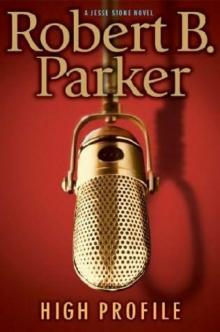 High Profile js-6
High Profile js-6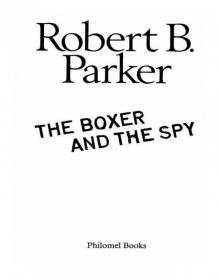 The Boxer and the Spy
The Boxer and the Spy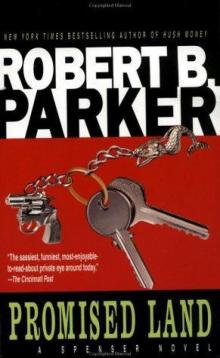 Promised Land s-4
Promised Land s-4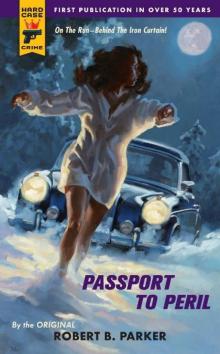 Passport to Peril (Hard Case Crime (Mass Market Paperback))
Passport to Peril (Hard Case Crime (Mass Market Paperback))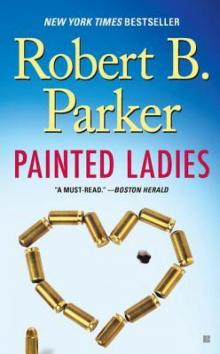 Painted Ladies
Painted Ladies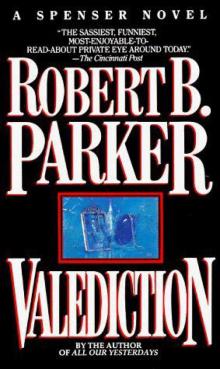 Valediction
Valediction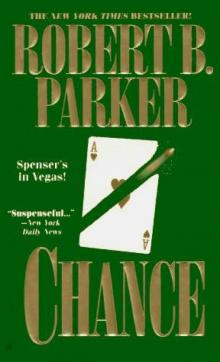 Chance s-23
Chance s-23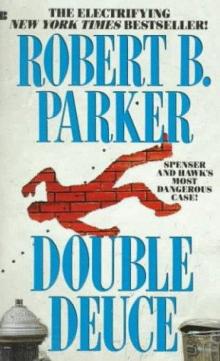 Double Deuce
Double Deuce Wilderness
Wilderness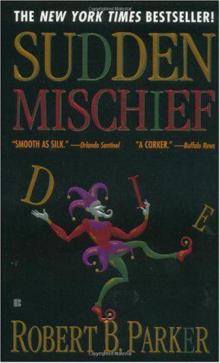 Sudden Mischief
Sudden Mischief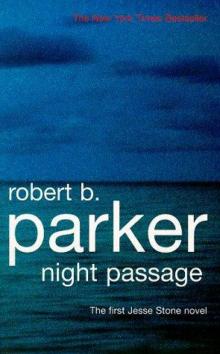 Night Passage js-1
Night Passage js-1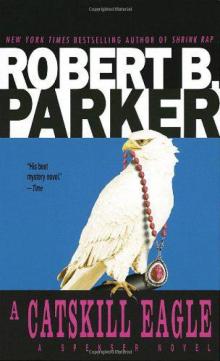 A Catskill Eagle
A Catskill Eagle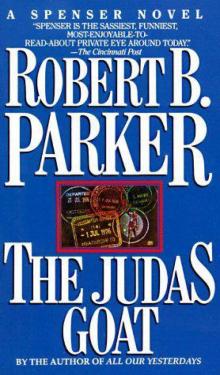 The Judas Goat
The Judas Goat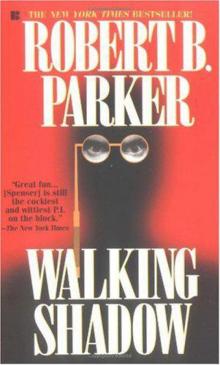 Walking Shadow
Walking Shadow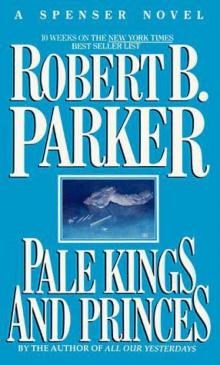 Pale Kings and Princes s-14
Pale Kings and Princes s-14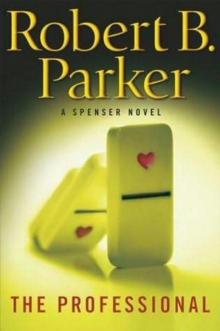 The Professional
The Professional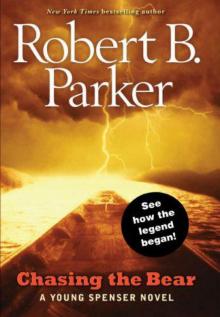 Chasing the Bear s-37
Chasing the Bear s-37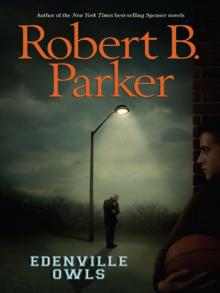 Edenville Owls
Edenville Owls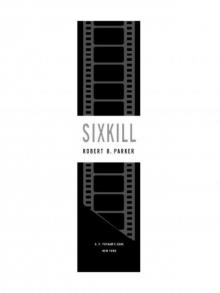 Sixkill
Sixkill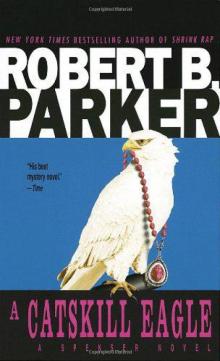 A Catskill Eagle s-12
A Catskill Eagle s-12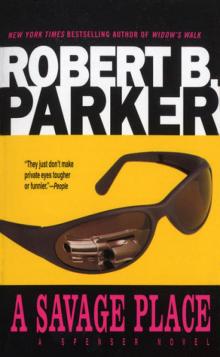 A Savage Place
A Savage Place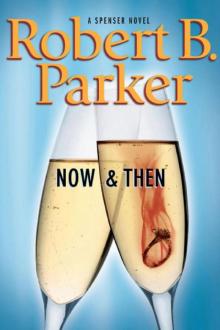 Now and Then s-35
Now and Then s-35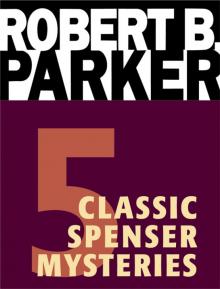 Five Classic Spenser Mysteries
Five Classic Spenser Mysteries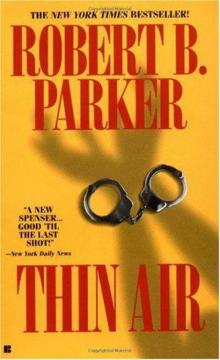 Thin Air s-22
Thin Air s-22